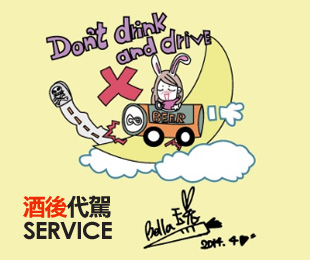酒駕иҮӘж®әиҲҮз„Ўе·®еҲҘж®әдәә Join forces against drunk driving

еҚҒе№ҙдҫҶпјҢеңЁжҲ‘еңӢжҜҸе№ҙз„Ўиҫңжӯ»ж–јй…’еҫҢ駕и»Ҡзҡ„дәәпјҢйҖЈеё¶жүҖйҖ жҲҗзҡ„еҸ—е®ідәә家еұ¬зҡ„иә«еҝғеӮ·е®іпјҢе®Ңе…Ёз„Ўжі•дј°з®—гҖӮеҗҚдәәеҰӮеӘ’й«”еҗҚеҳҙгҖҒж”ҝжІ»дәәзү©й…’駕иӮҮдәӢж–°иҒһпјҢйӮ„жҳҜжҷӮеёёе……ж–ҘеӘ’й«”гҖӮеӨҡж•ёеңӢдәәе°Қ酒駕еҝғеӯҳиј•еҝҪгҖҒеғҘеҖ–зҡ„еҝғж…ӢпјҢе·ІдҪҝ酒駕жҲҗзӮәжҲ‘еңӢ當д»ҠйқһеёёеҡҙйҮҚзҡ„зӨҫжңғе•ҸйЎҢгҖӮ
еңЁзҠ§зүІдәҶдёҖдҪҚиҮәеӨ§йҶ«йҷўзҡ„жӣҫеҫЎж…ҲйҶ«её«д№ӢеҫҢпјҢеӣӣе№ҙдҫҶжҲ‘еҖ‘з„ЎжҷӮз„ЎеҲ»дёҚеңЁжӘўиҰ–пјҢйҖҷеҖӢзӨҫжңғжңүд»Җйәјж”№и®Ҡпјҹ
еҘ№зҡ„иҖҒеё«жҹҜж–Үе“ІйҶ«её«иҲҮиЁұеӨҡиӘҚеҗҢй җйҳІеҖЎиӯ°зҡ„дәәеЈ«е…ұеҗҢеүөиҫҰдәҶиҮәзҒЈй…’駕йҳІеҲ¶зӨҫжңғй—ңжҮ·еҚ”жңғпјҢиҖҢдёҖеӨ•зҷҪй«®зҡ„жӣҫеӘҪеӘҪйҷіж•ҸйҰҷеҘіеЈ«еҮәд»»зҗҶдәӢй•·пјҢйҖҷй …еҸҚ酒駕зҡ„зӨҫжңғйҒӢеӢ•ж–јжҳҜжҸӯз«ҝиҖҢиө·гҖӮйҖҷй …жҗ¶ж•‘жӣҙеӨҡдәәе…Қ於酒駕еӮ·е®ізҡ„е®Ңе…ЁеҲ©д»–зҡ„зӨҫжңғйҒӢеӢ•пјҢз”ұзңҫеӨҡе·ІеҸ—е®ізҡ„當дәӢдәәеҸҠ家еұ¬еҶҚж¬Ўз«ҷеҮәдҫҶиҰӢиӯүпјҢз„ЎйқһжҳҜиҰҒе–ҡйҶ’зңҫдәәзҡ„иүҜзҹҘиүҜиғҪпјҢеӨ§е®¶дёҖиө·йҮҚе»әгҖҢ酒駕йӣ¶е®№еҝҚгҖҚзҡ„з”ҹе‘Ҫеғ№еҖјйҳІз·ҡпјҢеңЁйҖҷеҖӢзӨҫжңғжЁ№з«ӢдёҖй …ж–°зҡ„ж–ҮжҳҺжҢҮжЁҷгҖӮ
ж–јд»ҠпјҢи¶…йҒҺдәҢиҗ¬е…ӯеҚғеҗҚе…¬ж°‘еңЁеңӢзҷјжңғзҡ„гҖҢе…¬е…ұж”ҝзӯ–з¶ІзөЎеҸғиҲҮе№іеҸ°гҖҚжҸҗжЎҲйҖЈзҪІпјҢиҰҒжұӮйҮқе°Қ酒駕гҖҒе…’иҷҗгҖҒжҖ§дҫөзҪӘзҠҜеўһиЁӯгҖҢйһӯеҲ‘гҖҚеҲ‘зҪ°гҖӮжҸҗжЎҲйҖЈзҪІйӣ–жҳҜд»ҘгҖҢйһӯеҲ‘гҖҚзӮәиЁҙжұӮпјҢжҲ‘еҖ‘еҜҹиҰәеҲ°зңҫеӨҡе…¬ж°‘еңЁе№ҫд№Һз„Ўжі•еҶҚе®№еҝҚ酒駕зҡ„зӨҫжңғеүөеӮ·еЈ“еҠӣдёӢпјҢйҖҷй …иЁҙжұӮзҡ„иө·еҝғеӢ•еҝөжҳҜзӨҫжңғе…ЁйқўжҖ§зҡ„з„ЎеҸҜжҺ©йЈҫзҡ„е…¬ж°‘зҡ„жҶӨжҖ’гҖӮжҲ‘еҖ‘иҰҒе°ҚйҖҷдәӣзңҫеӨҡзҡ„зҶұеҝғе…¬ж°‘иЎЁзӨә敬ж„ҸпјҢеҗҢжҷӮжҲ‘еҖ‘иҰҒе‘јзұІж”ҝеәңжӯЈиҰ–пјҡеҰӮжһңз„Ўжі•йҒҸйҳ»жҺҘйҖЈдёҚж–·зҡ„酒駕еӮ·дәәж®әдәәзҡ„йўЁж°ЈпјҢйҖҷиӮЎе°Қ酒駕йӣ¶е®№еҝҚзҡ„е…¬ж°‘еҠӣйҮҸеҚіе°Үеј•зҲҶгҖӮ
дёҚеҗҢж–јдёҖиҲ¬зҡ„дәӨйҖҡдәӢж•…пјҢеӣ 酒駕иӮҮдәӢиҖҢеӮ·дәЎзҡ„жҶҫдәӢжҳҜеҸҜд»Ҙй җйҳІзҡ„пјҢеҰӮжһңжҲ‘еҖ‘жҜҸеҖӢдәәйғҪиӘҚзҹҘ酒駕йӣ¶е®№еҝҚпјҢеҰӮжһңжҲ‘еҖ‘жҜҸеҖӢдәәйғҪеңЁеҝғдёӯеҠғдёҖйҒ“酒駕йӣ¶е®№еҝҚзҡ„йҳІз·ҡгҖӮ
дёҖж—Ұ酒駕иӮҮдәӢпјҢдёҖеҲҮйғҪеҫҢжӮ”иҺ«еҸҠдәҶпјҒ酒駕иӮҮдәӢиҖ…зҡ„дәӢеҫҢеӣӣйғЁжӣІв”ҖйҒ“жӯүгҖҒдёӢи·ӘгҖҒиі е„ҹгҖҒеқҗзүўпјҢе°ҚеҸ—е®іиҖ…еҸҠ家еұ¬йғҪж–јдәӢз„ЎиЈңпјҢе°Қж•ҙеҖӢзӨҫжңғйғҪж–јдәӢз„ЎиЈңпјҢд№ҹе°ұжӣҙйӣЈд»ҘиӯҰжғ•дё–дәәдёҚ酒駕гҖӮ
и©Ұе•Ҹпјҡж”ҝеәңйӮ„иғҪеҒҡд»ҖйәјпјҹеңЁз«Ӣжі•йҷўдёҠеҖӢжңғжңҹпјҢжңүйҷіжӣјйә—гҖҒжҷӮд»ЈеҠӣйҮҸй»ЁеңҳгҖҒиҰӘж°‘й»Ёй»Ёеңҳзӯүз«Ӣ委жҸҗжЎҲпјҢйҮқе°ҚгҖҢйҒ“и·ҜдәӨйҖҡз®ЎзҗҶиҷ•зҪ°жўқдҫӢгҖҚжңүй—ң酒駕йҳІеҲ¶иҷ•зҪ°иҖ…и¶…йҒҺеҚҒдә”й …дҝ®жі•е…§е®№жҳҜжҲ–еўһиЁӮгҖҢеҗҢи»Ҡе…ұиІ¬гҖҚжҲ–еҠ йҮҚ酒駕иҖ…еҗ„зЁ®иҷ•зҪ°гҖӮжҲ‘еҖ‘иҝ«еҲҮең°иҰҒжұӮеҹ·ж”ҝй»Ёе…Ёйқўеҹ·ж”ҝе…ЁйқўиІ иІ¬гҖӮ酒駕йҳІеҲ¶зӣёй—ңжўқдҫӢдҝ®жӯЈжЎҲе·ІжҳҜеңӢжңғи·Ёй»Ёжҙҫзҡ„йӣЈеҫ—зҡ„е…ұиӯҳпјҢжҮүеҲ—зӮәе„Әе…Ҳжі•жЎҲдҝғжҲҗеңЁжң¬жңғжңҹдёүи®ҖйҖҡйҒҺд»ҳи«ёеҜҰиЎҢгҖӮ
酒駕иҮҙдәәж–јжӯ»зҡ„жңҖй«ҳеҲ‘зҪ°дҝ®жі•жҸҗй«ҳзӮәеҚҒе№ҙпјҢжҳҜзӮәгҖҢжӣҫеҫЎж…Ҳжўқж¬ҫгҖҚгҖӮжӣҫеҫЎж…ҲйҶ«её«йҒҮйӣЈеӣӣе№ҙдҫҶпјҢжі•е®ҳжңӘжӣҫйҮҚеҲӨиӮҮдәӢиҖ…йҖҷй …жүҖи¬Ӯзҡ„гҖҢжӣҫеҫЎж…Ҳжўқж¬ҫгҖҚгҖӮи©Ұе•Ҹпјҡжі•е®ҳзҡ„еҲӨжұәзӮәдҪ•зёҪжҳҜеҒҸйӣўе…¬ж°‘зҡ„жңҹеҫ…пјҹ
酒駕жҳҜиҮӘж®әпјҢ酒駕д№ҹжҳҜз„Ўе·®еҲҘж®әдәәпјҢеӣ зӮәдәәе‘Ҫй—ңеӨ©е“ӘпјҒеҸҚ酒駕йҒӢеӢ•жҳҜдёҖй …дәәж¬ҠйҒӢеӢ•пјҢ敬йӮҖйҖҷж¬ЎжҸҗжЎҲйҖЈзҪІзҡ„е…¬ж°‘еҖ‘иҲҮжҲ‘еҖ‘еҗҢиЎҢпјҢиҮҙеҠӣж–јгҖҢйӣ¶й…’駕гҖҚзҡ„зӣ®жЁҷгҖӮ
We can count how many innocent people are killed by drunk drivers in Taiwan each year, but no one can measure the physical and mental trauma that such incidents inflict on victims’ families.
There are frequent news reports about well-known people, such as media pundits and politicians, getting into trouble for drunk driving.
Most Taiwanese do not take drunk driving seriously and drivers think they can get away with it. Such attitudes make driving under the influence an extremely serious social problem.
Four years have passed since 2013, when National Taiwan University Hospital trauma surgeon Tseng Yu-tzu (жӣҫеҫЎж…Ҳ) lost her life in a drunk driving incident, and during that time we have been closely watching to see whether social attitudes have been changing.
Taipei Mayor Ko Wen-je (жҹҜж–Үе“І) — who was Tseng’s teacher at the time, before he was elected mayor — along with many other people who supported the prevention of drunk driving incidents founded Taiwan Against Drunk Driving.
Tseng’s mother, Chen Min-hsiang (йҷіж•ҸйҰҷ), whose hair turned white overnight after Tseng’s death, became its director-general. This is how a social movement arose against drunk driving. It is an altruistic movement whose sole purpose is to save people from being harmed by drunk drivers.
Many victims and their family members have stood up to tell their stories, with no other purpose than to rouse the public’s innate moral sense so that people will establish and defend the principle of zero tolerance for drunk driving and make it a new measure of social civilization.
More than 26,000 people have signed a proposal on the National Development Council’s “Join” online public policy participation platform, calling for caning to be added as a possible punishment for people found guilty of drunk driving, child abuse or sexual assault.
Although the petition demands caning, we have the impression that many Taiwanese can no longer tolerate the social trauma caused by drunk driving, and the motivation behind that demand is widespread anger that cannot be concealed.
The public should salute these passionate people and call on the government to face the problem square on, because if it cannot stem the tide of repeat incidents of injury and death caused by drunk driving, the civic force of zero tolerance for drunk driving will soon explode.
Unlike traffic accidents in general, injury and death caused by drunk driving are preventable. They can be prevented if people recognize the need for zero tolerance for drunk driving and make it a line that cannot be crossed.
When a drunk driving incident happens, it is too late for regret.
The four-act play that the culprits of drunk driving incidents act out — apologizing, kneeling in penance, paying compensation and going to prison — is of no real benefit to victims and their families or to society in general, and it has little effect as a deterrent to driving under the influence.
What else can the government do? During the latest session of the Legislative Yuan, Democratic Progressive Party (DPP) Legislator Chen Man-li (йҷіжӣјйә—), and the New Power Party and People First Party caucuses proposed amending parts of the Road Traffic Management and Penalty Act (йҒ“и·ҜдәӨйҖҡз®ЎзҗҶиҷ•зҪ°жўқдҫӢ) concerning the prevention of drunk driving and penalties for related offenses.
They have proposed more than 15 amendments that involve adding clauses that make all passengers in a vehicle driven by a drunk driver criminally liable and imposing heavier penalties on drunk drivers.
We demand that the ruling DPP, which has full control of the legislative and executive branches of government, bear full responsibility for the progress of this bill. There is a rare cross-party consensus for the proposed amendments, so the bill should be given priority and passed during the current legislative session so that it can take effect as soon as possible.
The amendment that previously increased the heaviest criminal penalty for causing death by drunk driving is known as the “Tseng Yu-tzu clause.” However, during the four years that have passed since Tseng was killed, no judge has handed down the maximum penalty allowed by the clause to someone convicted of drunk driving.
Why are judgements so different from what ordinary people would want them to be?
Drunk driving is suicidal and it is also indiscriminate to the taking of life. Life is precious, so the campaign against drunk driving is a campaign for human rights.
People who signed the petition for caning are respectfully invited to join us in endeavoring for the goal of zero tolerance for drunk driving.
Vino Lin is secretary-general of Taiwan Against Drunk Driving.
Translated by Julian Clegg
дёӯж–ҮзүҲ-
иҮӘз”ұжҷӮе ұеҲҠзҷ»йҖЈзөҗ:
http://talk.ltn.com.tw/article/paper/1156423?utm_source=LINE&utm_medium=APP&utm_campaign=SHARE
иӢұж–ҮзүҲ-
Taipei TimesеҲҠзҷ»йҖЈзөҗ:
http://www.taipeitimes.com/News/editorials/archives/2017/12/06/2003683499/1
иЁ»:ең–зүҮзҝ»ж”қиҮӘиҮӘз”ұжҷӮе ұ


